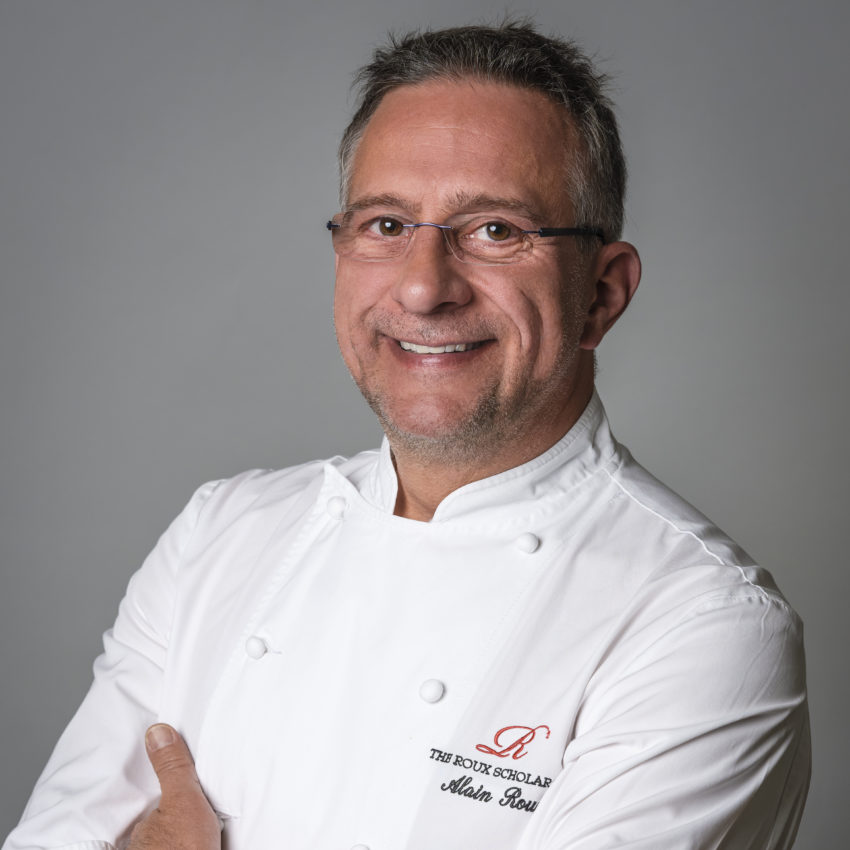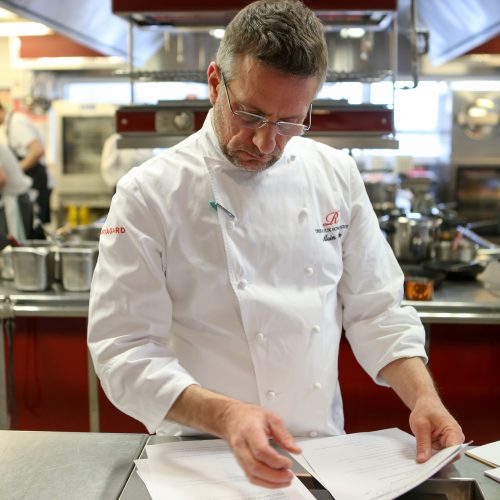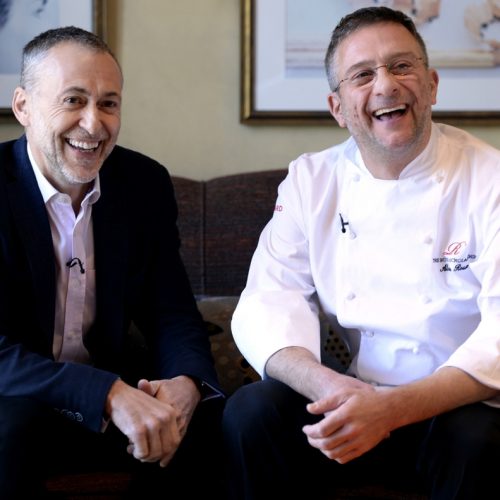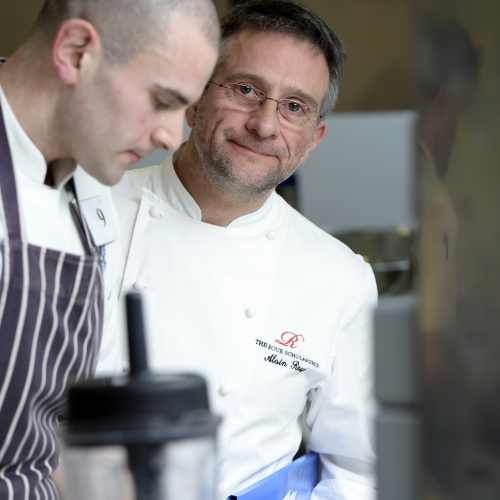
Alain Roux is Chef Patron, The Waterside Inn, Bray, and Roux at Skindles, Taplow.
Alain decided to follow in his father Michel’s and uncle Albert’s footsteps to become a chef aged 14, after growing up learning about food from them and from his mother and grandmother.
Alain’s career began at the age of 16 when he embarked on a two-year pastry apprenticeship with Chef Denis Ruffel at the Pâtisserie Millet in Paris. There followed many years working in restaurants before joining forces with his father at The Waterside Inn. His varied career led Alain to work in some of the best restaurants in France, all of them family run businesses, providing the best insight and foundation he could imagine for his future role as Chef Patron of his own family businesses.
Apart from his father, who had perhaps the biggest influence as mentor, Alain holds Chef Ruffel, to whom he was apprenticed, in special esteem, citing him as one of the great influences in his career and one of the best chefs he ever met. Alain was privileged to enjoy an extraordinary apprenticeship in pastry under the care and tutorship of Chef Ruffel. Alain remembers him as outstanding in every way, not only in terms of his skills as a pastry chef and impassioned teacher, but also as a multi-talented, multitasking chef and all-round great professional. Chef Ruffel was generous with his time loved to share his knowledge and expertise. He led by example in the kitchen, in the way he looked after and respected his brigade.
Having completed his apprenticeship, the next six years of Alain’s career were spent working as a cook in some of France’s most esteemed restaurants. Firstly, at the three-star Michelin Restaurant Pic in Valence with Chef Alain & Jacques Pic, then with Chef Jean Yves Bernard at one Michelin starred Le Domaine D’Orvault in Nantes. This was followed by a year’s national service spent working as a cook for French President M. François Mitterrand, at the Élysée Palace in Paris, alongside Chef Joel Normand.
Alain then joined the brigade at two Michelin starred La Bonne Étape in Château Arnoux-Saint-Auban, led by father-son duo, Chefs Jany and Pierre Gleize, before taking up a position with Chef Christian Germain’s one star Michelin restaurant at Château de Montreuil in Montreuil-sur-Mer. Alain’s final appointment, before starting his career at The Waterside Inn, was at La Côte St. Jacques in Joigny with Chef Jean-Michel & Michel Lorain.
In 1992, at the age of 24, Alain returned to Great Britain to join his father, Michel Roux OBE, in the kitchen at The Waterside Inn, starting first as a demi-chef de partie cook, progressing to sous chef three years later. In 2001, he became joint Chef Patron of The Waterside Inn with his father, taking over in his own right in 2002.
In 2000, Alain was invited to become a Master Pâtissier in the International Association Relais Desserts putting him in league with the best pastry chefs in the world. In 2008, Alain became an Honorary Fellow of the Faculty of Professional Studies at Thames Valley University. In November 2018, Alain alongside his father Michel, opened a new French-style Brasserie, their first joint venture, Roux at Skindles, nearby The Waterside Inn. 2020 saw Alain become a member of the Royal Academy of Culinary Arts, the leading professional association in UK.
In 1999, Alain joined the judging panel of the Roux Scholarship and, since 2015, he has been joint chairman, alongside his cousin, Michel Roux Jr.



What are your early memories of enjoying food?
Some of my happiest memories as a child were spent with my grandma who had a lovely, abundant garden at her home near where I grew up near Chantilly in Picardy in France. It was beautiful and bursting with vegetables, fruits, chickens and rabbits. I just loved spending time with her there lending a hand and preparing meals together. My mother was a great cook too and regularly spoiled us with her wonderful specialities. My love of food and cooking was certainly inspired by them and of course, my father. He arranged a trip every year for us to visit a different top gastronomic restaurant. These were special treats and always held in great anticipation.
What do you remember about being at The Waterside Inn as a child?
Between the ages of 10 and 15 years, I could be found hanging around the kitchen at The Waterside. I was hooked! I just loved sitting in a corner taking it all in, a ringside view behind the scenes. It was endlessly fascinating to feel the buzz, watch the hustle and bustle, the camaraderie of the team, the way they bonded together, the pressure of service, the incredible displays of skill, chefs working with sometimes unusual and astonishing raw ingredients to create amazing dishes. I remember the wonderful sights, the smells, the ambience. There was nowhere more exciting …or dangerous to me or anywhere I’d rather be. You never knew what drama would unfold next. I remember one occasion when an unfortunate girl cook took a blast from a return of flame upon opening a gas oven. There was a huge explosion that shook the kitchen and deafened us all. Everyone jumped a metre in the air! The girl’s face and hair were scorched and she was rushed to hospital. Luckily, she suffered no lasting damage and recovered quickly. Whenever I had the chance, I would sneak in the kitchen and my dad would find me sticking my hands and fingers into everything, seeing what I could pinch or eat. Now and then, my dad would spoil me with some memorable plates of food there, in particular steak with Béarnaise sauce and caramelised onions followed by puff pastry, fresh strawberries and Chantilly cream, all washed down with Coca Cola, what a treat!”
Apart from your father and uncle, who are your culinary heroes?
When I was doing my apprenticeship at Pâtisserie Millet in Paris, Chef Denis Ruffel had a big heart and I will never forget what I learned from him. He taught me that pastry is an exact science and equipped me with the sophisticated, artistic discipline, the rigour, skill and attention to detail that I needed to excel in pastry. Chef Ruffel is a constant inspiration and I am forever grateful to him.
What would you say to chefs who are daunted at the prospect of entering the Roux Scholarship?
I would say they have nothing to lose and everything to gain. A world of opportunity awaits. Entry is free and open to every young chef, whatever their colour, gender, background or place of work; whether they work in a village pub, hotel, foodservice, a café or fine dining restaurant, they are eligible and stand an equal chance of winning. There are no barriers to entry as long as a chef suits the age requirement. Beyond that, all you need is drive, talent and enthusiasm. It’s a chance to step outside your comfort zone and build your confidence and maturity. Just the experience of competing can be a huge learning curve. If you don’t win the first time, you can come back next year with the added advantage over other first-time competitors. I encourage all young chefs to take up the challenge and it’s likely they already have the skills needed in their repertoire.
How can the Roux Scholarship help a chef's career?
I worked from the age of 16 in restaurants learning my trade, from the bottom up. Likewise my father, who began his apprenticeship aged 15. I started at The Waterside Inn as a young demi chef and had to work hard to make the grade and move up the ranks. And I’m still learning, you never stop. The Roux Scholarship should be looked at in this way, as a brilliant opportunity to learn and hyperlink to greater confidence, experience, and contacts. You just need the drive and initiative to apply, whether you work in a starred establishment or a takeaway. The reason my father and uncle started the Scholarship in 1983 was to widen the horizons of British chefs, giving them the best opportunities to learn and gain international recognition. Competing and winning unlocks doors not only, to the best restaurants in the world, but doors to unrivalled opportunity.
Have previous finalists impressed you by using the influences of other global cuisines with classic French?
In the early stages of the competition, there is room for competitors to make their mark with their signature cooking and modern interpretation. The Final is more a test of theory and classic technique. It is always so exciting to discover the creativity and influences that inspire the competitors’ cooking, especially global flavours, ingredients and styles. Perhaps this, more than anything, sums up the influence the Scholarship has had on our industry over the years, and continues to have, as a beacon of British talent throughout the world.
What do you enjoy about judging the Roux Scholarship?
The quality of the chefs coming through just keeps getting stronger which is itself testament to the impact the Scholarship has, and continues to have, in the culinary world. The young chef entrants inspire and surprise us. Judging is a mutually beneficial experience, we learn and are inspired by the competitors, just as much as they may learn from us. Our reward is seeing the scholars blossom and grow in confidence and achievement, with the chance of becoming a judge alongside us one day.
What advice would you give applicants?
Firstly, I would say they should relax and have fun! A young chef has nothing to lose. Of course, you need some basic skills and proficiency, there is plenty of advice and tips to be found on this website. But the best advice is to be true to yourself and to have confidence in your palate and style of cooking. It is very important to get your employer on board too, and to explain to them the benefits it can bring to both of you.
What makes The Roux Scholarship special?
The Scholarship is a fantastic platform for anyone’s career. A place in the regional heats or final is very beneficial and of course winning is just the beginning to a whole new world of opportunity. Just taking part and preparing your entry is a worthwhile discipline and learning curve in itself. To reach the regionals and final brings amazing kudos and contacts that money cannot buy. Of course, to win the Scholarship is like winning the Oscar, it’s the pinnacle but also just a beginning, as a world of adventure and opportunity opens up. Not only do you get instant recognition and the chance to work in the Michelin three-starred restaurant of your dreams anywhere in the world, but you join an elite club of British chefs with a direct line to the Roux family and our scholars’ and judges’ network of connections and advice; it’s really special.
How do employers/kitchen brigades benefit from entering their chefs?
There are huge benefits for the employers and kitchen brigades, we offer a package deal. We realise that some employers may be put off entering their chefs because of the risk they might leave if they win. To help mitigate the risk, we have in place a mentorship award. If the winner leaves their job before 15 months after the final, the employer is awarded £6,000. If the winner stays beyond 15 months, he or she can claim the £6,000, so this is a major incentive for the chef to stay on, with all the benefits this brings. In general, to encourage entry is a great way to motivate the individual and your team and so build a stronger brigade. The spotlight of publicity and attention shines on the employer as much as the competitor, especially if they make it to the regionals and/or final. Plus, the competing chefs are showcasing all they have learned from their mentors/employers. So our competitors can be a positive reflection on their employer/mentor and the direction, experience and professional advice they have benefitted from. On another level, the competitors can share with their brigades all that they learn from their experience of competing, especially following their three-month stage, if they win the competition.
Why is it important to learn and master the classic cooking techniques?
I think classic French training provides a strong and invaluable foundation, making it easier for chefs to improvise and develop their own style and dishes. Unless you can master the classic techniques, you will not have the tools you need to progress. It is like learning to walk before you can run, it is the first step on the road of your culinary adventure.
What have YOU learned thanks to being a judge?
The importance of taking care of our young talent and so ensuring the future of our beloved industry. My dad used to say that knowledge means nothing unless you pass it on and this sums it up for me. Being a judge is a privilege and I look forward to every competition. I love meeting the competitors and always leave every competition inspired and motivated to make the next one even better. For me, the Scholarship is all about making new friends and building culinary alliances throughout the industry.
